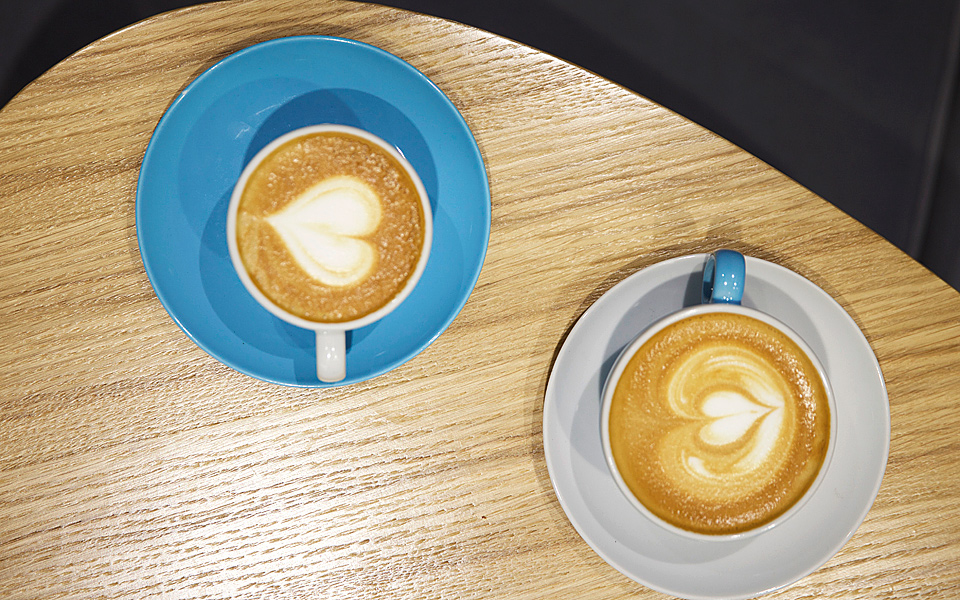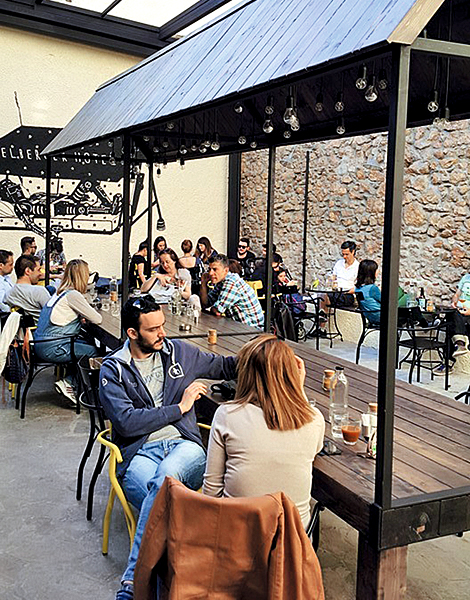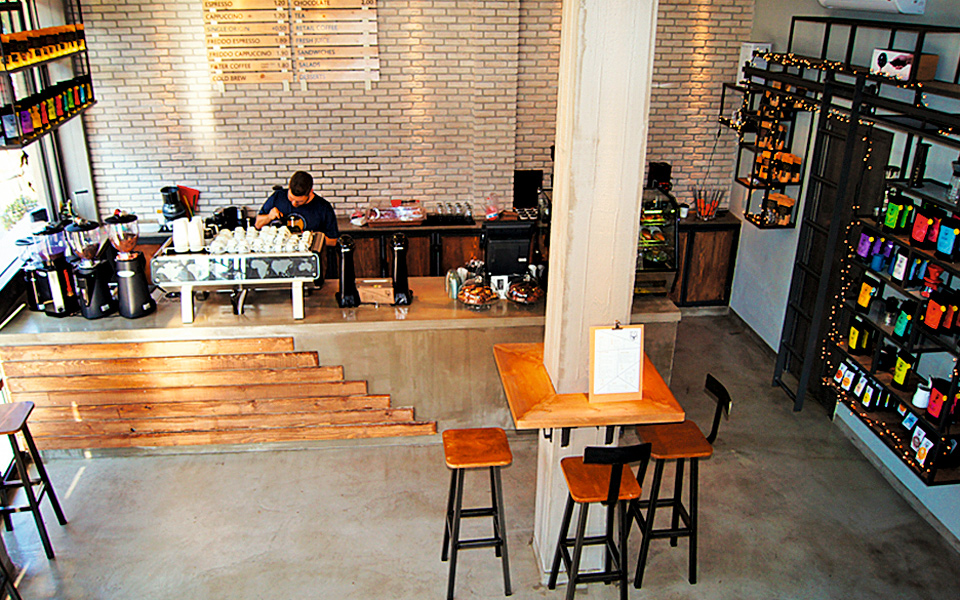Exploring Piraeus on Foot
Whether you’ve just stepped off a...

Greeks are coffee-mad and at Taf Café, the owners buy green coffee beans and roast them themselves.
© Dimitris Vlaikos
Greek coffee used to be known as “Turkish” until 1974. Then our neighbors invaded Cyprus and the name changed because of political sensitivities; however everybody still assumes that the Turks drink more of the stuff. Surprisingly it is the Greeks who drink twice as much, with the opposite being true for tea. The name change did not affect the actual taste of coffee made the Arab or Turkish way. Lightly roasted and finely milled grains are boiled together with the required amount of sugar in a traditional briki (or “ibrik”, a small brass pot with a long handle), over hovoli i.e. embers. The entire contents of the briki are poured slowly into a small cup, which the consumer must handle carefully in order to avoid drinking the sediment.
Greek coffee is sipped slowly, over long conversations about politics, soccer, relationships, shared interests, life in general, and its dregs may be “read” by professional or amateur fortune tellers to predict one’s future. In 1957 a chance invention during the Thessaloniki fair changed the way coffee was drunk in Greece. An employee of an importer of a major instant coffee brand couldn’t find hot water at the company’s booth so he made coffee with cold water using a shaker that was lying around for chocolate drinks. Thus “frappe” was born, a concoction that quickly substituted traditional Greek coffee as the preferred beverage of the locals. Frappe is consumed much faster, often with a straw, and has many devotees, among them senior government ministers who bring their own plastic cup into the studio during TV interviews.

Underdog has a reputation for having one of the best barista teams in Athens.

The roasts at Tailor Made have won several awards.
© Sofia Papastrati
Greek coffee does not deliver the utmost in terms of taste and aroma from the beans and cold frappe with a hefty dose of ice fares little better. As the frappe steadily loses ground to gourmet coffee, it is good traditional Greek coffee that is becoming harder to find. It’s a pity, as Greek coffee is made with what was historically the first ever brewing method, which probably originated in Yemen more than 500 years ago.
One can at least find consolation in the ever growing number of fine gourmet espresso (or cappuccino, latte, etc) coffee peddlers with a variety of choice that would have been unthinkable just a few years ago. Those who are not yet convinced that coffee should be drunk hot, with the possible exception of exotic cold brews, will enjoy Freddo Cappuccino, which is topped with a cold milk-based foam, and Freddo Espresso, which despite their names, differ greatly in taste and preparation from their Italian counterparts.
At any rate, as more locals join the ranks of aficionados with discerning palates, gourmet cafés are popping up around the city, transforming Athens into a destination for world class coffee.
“Greek coffee is sipped slowly, over long conversations about politics, soccer, relationships, shared interests, life in general, and its dregs may be “read” by professional or amateur fortune tellers.”

The cold brew at KUDU is not to be missed.
CULTURAL SHIFT
A rapidly growing number of specialized importers and roasters of fine beans are now catering to gourmet coffee shops, often their own, staffed by highly trained baristas who are passionate about their work.
There is an annual barista competition and even a TV show by the name of “Golden Barista.” Greeks are fast discovering high quality coffee and many go to great lengths to purchase high-end espresso machines and coffee grinders for their homes.
One of the pioneers in gourmet coffee is Yiannis Taloumis of Taf, which sources green beans from carefully chosen estates around the world and freshly roasts them. Award-winning baristas craft fine coffees from a changing varietal selection that you may enjoy in the recently renovated coffee shop, ideally with one or more of their delicious croissants. Taf also sells specialty coffee beans, ground upon request, including a gourmet ibrik, otherwise known as “Greek” coffee.

MOKKA currently sits in the hands of its fourth generation of coffee merchants.
© Clairy Moustafellou
Not far from Taf is Mokka, which is now in the hands of a fourth generation of coffee merchants. Nikos Psomas has set up Mokka, using the name of the original coffee shop opened by his great-grandfather Chris Samourkas in 1922, in the same location, an exquisite neoclassical building at 44 Athinas Street. In this large and attractively appointed store you will find a wide selection of specialty coffees, mainly from Brazil, and enjoy a cup in the café.
Larger is not always better; a case in point being Kaya, the tiny coffee shop in the corner of a dogleg-shaped arcade that connects Kolokotroni and Voulis streets, very close to Syntagma Square. The tantalizing aroma of coffee permeates throughout the arcade until 6 o’clock in the evening when this excellent espresso bar closes its door for the night.
Customers can choose from four different varieties, which they may enjoy for as little as €1.80 for a double espresso or buy ground coffee beans to brew at home… after a spirited discussion with Antonis or Lambros as to the optimal grind level and the best available home grinders.

Grab one of KAYA's fragrant blends before they shut for the evening.
© Clairy Moustafellou
Owned by professional barista Tasos Delichristos, the Underdog in Thiseio uses the latest brewing techniques and trends, including cold brewing, and boasts one of the best teams in Athens. George Koustoumbardis, one of its baristas, is this year’s winner of the World Coffee in Good Spirits Championship which “promotes innovative beverage recipes that showcase coffee and spirits in a competition format.” In addition to a good selection of coffees, they offer a number of innovative concoctions such as the “espresso tonic.”
Tailor Made was one of the first to set up shop in now-trendy Aghias Irinis Square in the historical center of Athens, when most of the stores there were still selling flowers and plants. This micro roastery and cocktail bar is housed in a wonderful building designed by Ernst Ziller and is one of the trendier in Athens, winning several awards for the quality of its roasts.
Although its name is perhaps more suited to a butcher shop, Kudu is an up-and-coming coffee roaster with state-of-the-art equipment. They supply many coffee shops with fresh roasted beans and run a nice café in the affluent northern suburb of Neo Psychico, where customers may sample a fine selection of beans carefully brewed by skilled baristas. You should try their cold brew, which has a markedly different taste to that of an espresso or filter coffee made with the same variety.
Kaya • 7 Voulis, Syntagma • Tel. (+30) 213.028.4305 | Kudu • 22 25th Martiou, Neo Psychico • Tel. (+30) 217.722.3040
Mokka • 44 Athinas • Tel. (+30) 210.321.6892 | Taf Café • 7 Emmanouil Benaki & Panepistimiou • Tel. (+30) 210.380.0014
Tailor Made • 2 Aghias Irinis Square, Monastiraki • Tel. (+30) 213.004.9645 | Underdog • 8 Irakleidon, Thiseio • Tel. (+30) 213.036.5393
Whether you’ve just stepped off a...
Old and new hangouts, cafés, sandwich...
Six Athenians tell us about their...
A stroll down one of the...